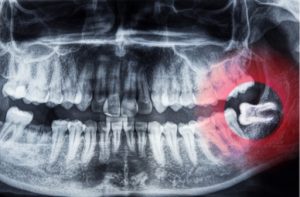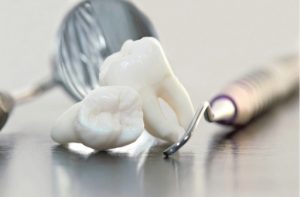Are you beginning to notice some sensitivity in the back of your gums? Wondering whether you have to remove wisdom teeth?
Wisdom teeth are the third and last set of molars that grow during the earlier stage of human development. However, today, thanks to advanced oral care and hygiene, they are merely obsolete since our molars are all that are necessary. But when wisdom teeth begin to emerge, they can shift and impact the alignment of your teeth and jaw. That’s why extracting them is important.
Maintaining regular checkups with your Ottawa dentist at Rockcliffe Dental & Denture Centre will help monitor the development of them, but in the meantime, we are going to talk about some signs that you need to remove wisdom teeth.
Do You Have to Remove Wisdom Teeth?
In general, oral surgeons and dentists recommend having wisdom teeth removed only if they cause problems or are likely to cause problems in the future. To this day, there are no scientifically proven benefits of pulling your last set of molars out if they don’t cause any problems. In addition, wisdom tooth removal is unpleasant and may lead to undesirable side effects.
When Wisdom Teeth Do NOT Have to Be Removed
You may keep your wisdom teeth or the third molars at the very back of your mouth if they are:
- Positioned and biting correctly with the opposite teeth
- Healthy
- Fully erupted (grow in completely)
- Able to be cleaned thoroughly as part of daily dental hygiene
When to Get Your Wisdom Teeth Out
However, many times, wisdom teeth grow at various angles, even horizontally, or don’t have enough room to come in fully. Your Ottawa dentist may recommend that you have your wisdom teeth removed as soon as possible if they:
- Emerge partially through the gums. In that case, the area would be hard to see and clean properly. This will attract bacteria that can cause oral infection and gum disease.
- Remain completely hidden within the gums. If your wisdom can’t emerge normally, they often become impacted within your jaw. This could lead to an infection or a cyst that could damage adjacent teeth or the supporting jaw bone.
- Crowd nearby teeth. If your wisdom teeth don’t have enough room to grow in properly, they can crowd or damage neighbouring teeth.
Some dentists believe that you have to remove wisdom teeth before they fully emerge. Dentists also recommend getting them out at a younger age, when the recovery is faster and easier and before the bone and the tooth roots are completely formed. This is why many young people choose to have their wisdom teeth pulled even before they cause any problems.
Signs That You Need to Remove Wisdom Teeth
Most issues with wisdom teeth happen when a person is between 15 and 25 years old, and very few people older than 30 experience problems with them. However, a person at any age may require a wisdom tooth extraction.
Common signs that you need to remove wisdom teeth include:
- Sensitivity & pain in the back of your mouth. The first and most obvious sign that will highlight that you need your wisdom teeth removed is when you really begin to feel them. Whether it’s eating, brushing your teeth or doing nothing at all, if you begin to experience pain, sensitivity or a slight throbbing sensation, it’s time to schedule an appointment with your dentist to have them checked.
- Inflammation around the gums. When your wisdom tooth begins to emerge, it can cause inflammation in the gums. It will appear as reddish, slightly swollen areas along the gum line that feel sore to touch and even make it challenging to clean properly when brushing.
- Cysts develop in your mouth. After an extended period, if the wisdom teeth are ignored, cysts can begin to develop in your mouth. Cysts are fluid-filled sacs that can end up impacting and damaging the roots of neighbouring teeth.
- Stiffness & pain in the jaw. Stiffness and pain can also occur around the jaw area since wisdom teeth can start to shift the teeth and jawline. Experiencing limitations with opening and moving your mouth and jaw can be an indicator of this as well.
- Sinus problems. Did you know that problems with your mouth and oral health can impact your sinuses? Dental issues, including your wisdom teeth, often cause sinus problems. If you experience congestion, pressure or pain with your sinuses, this can be a sign that highlights the need to have your wisdom teeth removed.
- Bad breath & bad taste in the mouth. It is difficult to clean the delicate gum tissue surrounding misaligned or impacted wisdom teeth, which can lead to trapped food and bacterial plaque that can lead to infection over time. The resulting bacteria release sulphur compounds, which can create a constant unpleasant taste in your mouth, along with extremely bad breath.
- Cavities & tooth decay. The position of your wisdom teeth can have a significant impact on cleaning surfaces where bacteria may reside. If the bacteria grow within the irritated gum pockets, they can promote the development of cavities, leading to infection down the road.
- Teeth are not straight. Many times, our jaws are not large enough to accommodate the third set of molar teeth. As such, they bump against other teeth and grow sideways. If the wisdom teeth come in misaligned or crooked, they can cause other teeth to shift. They might even damage the neighbouring teeth.
What Are the Risks of Wisdom T00th Extraction?
The decision of having your wisdom teeth removed if they aren’t impacted or causing any issues needs to be weighed against the potential risks and benefits of having them removed.
Choosing a skilled and professional dentist to perform your oral surgery will minimize the risk of complications. However, any surgical removal of wisdom teeth carries the following risks:
 Bleeding that won’t stop for approximately 24 hours.
Bleeding that won’t stop for approximately 24 hours.- Swelling and pain in your gums and tooth socket.
- Slow-healing gums.
- Jaw pain or difficulty opening your jaw.
- Damage to dental work, such as bridges or crowns, or to roots of neighbouring teeth.
- Numbness in your lips and mouth after the local anesthetic wears off caused by swelling or nerve damage in your jaw. This numbness usually goes away over time, but, in rare cases, it may persist.
- An opening into your sinus cavity in case of a wisdom tooth removal in the upper jaw.
- Dry socket, which causes swelling and severe pain. It occurs when the blood clot that forms within the open tooth socket dislodged too soon.
What Are the Risks of Keeping Your Wisdom Teeth?
If you choose not to have your wisdom teeth pulled, you may experience the following wisdom teeth symptoms:
- If there is not enough room in your mouth for your wisdom tooth to grow in, it may become impacted and trapped under the gums.
- Your wisdom tooth may erupt only partially, causing a flap of gum tissue to grow over it. This can lead to trapping food debris under the flap and make your gums painful, red, and swollen, – the first signs of an infection.
- There is a greater risk of getting periodontal diseases and cavities at the back of your mouth if you choose to keep your wisdom teeth. Visiting Rockcliffe Dental & Denture Center for a dental exam two times a year can help to find and treat these problems early.
- If infection occurs around impacted wisdom teeth, it can cause damage to surrounding bones and teeth. A fluid sac may form around the impacted tooth, which can grow into a cyst over time. This could cause serious damage to the jaw, bones, and neighbouring teeth.
- Your wisdom teeth may make future orthodontic treatment problematic.
Making the Decision
When it comes to deciding whether to remove wisdom teeth, you ultimately have only two options:
- Have your wisdom teeth removed.
- Don’t have your wisdom teeth removed.
Whether you choose to keep or remove your wisdom teeth, you need to carefully weigh all the risks and benefits associated with the decision. Make sure to consult a skilled dental professional in Ottawa for careful evaluation. When making the decision, keep the following key points in mind:
- Ask your dentist to check your wisdom teeth if you are a young adult, especially between the ages of 17 and 19 years old.
- Your dental professional may advise you to pull your wisdom teeth if they crowd other teeth, cause pain or an infection, or can’t break through the gums.
- Some oral surgeons and dental professionals believe that it is best to extract wisdom teeth before you are 20 years old, because it would be easier to take them out when the roots and bones are not fully formed and are still soft. In addition, when you are younger, you tend to heal faster.
- Healthy wisdom teeth that come in properly don’t cause problems and don’t need to be removed.
If you didn’t have any problems with wisdom teeth by now, you may never have them in the future, especially if you are already older than 30.
Make the Right Decision with the Help of Rockcliffe Dental & Denture Centre
Although wisdom tooth extraction is one of the most common dental procedures, this often won’t emerge as a problem for many adults. When deciding whether you have to remove wisdom teeth, remember that extracting them when signs, such as the ones listed here appear, is imperative to avoid impacting and damaging your teeth and jaw alignment.
If it’s time for wisdom tooth extraction, we can help. Contact our Ottawa dental clinic today to schedule your next appointment and find the relief you’ve been waiting for.
Read more: